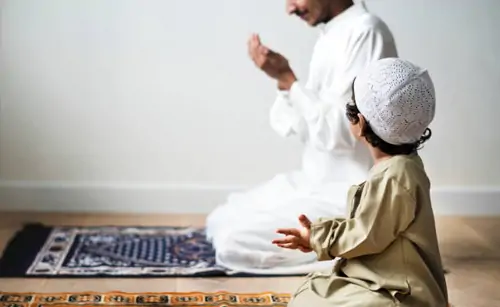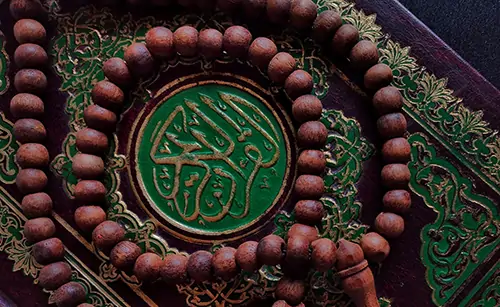Learn Namaz Quickly: Step-by-Step Easy Way for Beginners

Namaz, also known as Salah, is the most important part of the Muslim faith. It's a beautiful way of communicating with Allah, a daily rhythm that weaves mindfulness and gratitude into the fabric of human beings. To learn Namaz quickly one can face challenges, especially beginners. But worry not, dear friend, for this guide will be your companion on this sacred journey. Moreover, we'll take things step-by-step, ensuring you grasp the essence of Namaz learning for beginners with clarity and confidence. After reading this blog, you can offer your Namaz regularly and won't need any other guide.
Before We Begin: The Essentials for Namaz

Firstly, understand that nmaz is not merely a set of physical postures. It's a conversation with your Creator, a heartfelt expression of submission and thankfulness. You have to approach it with sincerity and an open heart.
Secondly, Wudu is important for Namaz. Wudu purifies your soul and body, preparing you for your encounter with the Almighty. Before connecting with your Creator in Namaz:
- Prepare your body and mind with Wudu, a cleansing ritual.
- Start by saying "Bismillah" (In the name of God).
- Wash your hands three times, then rinse your mouth and nose.
Now, wash your face three times, from forehead to chin and ear to ear. Remember your arms and elbows, washing them up to three times with each hand. Wipe your head once with wet hands, then clean your ears gently with your fingers. Lastly, wash your feet up to the ankles three times each, including between your toes. Finish with a prayer of gratitude, and you're ready to stand tall in Namaz!
Now, let's delve into the heart of the matter, Namaz:
Learn Namaz(Salah)Step By Step:
Each Salah comprises five fundamental postures, known as Rakahs (Namaz ke arkan). As you perform them, focus on the meaning behind each movement, allowing your heart to sync with your body.
1. Niyyah (Intention)
Before Namaz (Salah) start, set your intention. Silently declare in your heart that you are standing before your Allah, ready to offer your prayers. This simple act sets the tone for your spiritual connection.

2. Qiyam (Standing)
Stand tall, facing the Qibla (direction of the Kaaba in Mecca). Imagine yourself standing before the Divine Presence, radiating respect and humility. Keep your feet shoulder-width apart, head held high, and gaze focused on the spot ahead.
3. Takbir (Raising Hands)
Raise your hands with fingertips pointing towards the sky, and say "Allahu Akbar" (God is Great). Let these words resonate, signifying your submission to your Creator Almighty Allah.
4. Ruku' (Bowing)
Keeping your back straight and parallel to the ground, bend forward from your waist. Place your hands on your knees, keeping your fingers spread apart. Feel your humility as you bow before the One who deserves all worship.
5. Sujud
Place your forehead, nose, and palms on the ground, keeping your forearms slightly apart. Touch your knees and toes lightly to the ground. Close your eyes and surrender completely to the Divine Presence. In this posture, whisper words of praise and supplication.
6. Jalsa (Sitting)
Sit back on your heels with your toes flat on the ground. Place your hands on your thighs, palms resting downwards. This is a moment of reflection, where you contemplate the meaning of your prayer.
7. Tashahhud
Raise your right index finger while saying "Ashhadu allaa ilaha illallah wa ashhadu anna Muhammadar Rasulullah" (Peace and blessings of Allah be upon you). Imagine sending greetings to the Prophet Muhammad (PBUH) and all believers before and after him.
8. Salam
Turn your head to the right and say "As-salamu alaykum wa rahmatullahi" again. Then, repeat it while turning your head to the left. Now raise your hands for the Dua; this signifies the conclusion of your Namaz and your return to the earthly realm.

Verses From The Quran regarding Salah (Nmaz):
“Maintain with care the [obligatory] prayers and [in particular] the middle prayer and stand before Allah, devoutly obedient.” 2:238
“And establish prayer at the two ends of the day and at the approach of the night. Indeed, good deeds do away with misdeeds. That is a reminder for those who remember.” 11:114
“Establish prayer at the decline of the sun [from its meridian] until the darkness of the night and [also] the Qur’an of dawn. Indeed, the recitation of dawn is ever witnessed.” 17:78
“O Children of Adam! wear your beautiful apparel at every time and place of prayer” 7:31
Tips to learn Namaz quickly
If you are a beginner and want to learn nmaz quickly, then here are some tips to help you.
Start Simple
Begin with the Fajr (dawn) prayer, which consists of two Rakahs. Gradually increase the number of Rakats as you become more comfortable
Find a Teacher
Seek guidance from a knowledgeable imam or mentor who can answer your questions and correct your mistakes. If finding a teacher is hard, here is a Namaz learning for beginners course. In this, you can ask all your queries related to Namaz (Salah) to your teacher, and he will correct all your mistakes.
Focus on Meaning
Take your time with memorizing Arabic phrases. Understand the essence of each verse and supplication you recite.
Be Patient
Namaz learning for beginners takes time and practice. Be kind to yourself and celebrate your progress, no matter how small.
Make it Meaningful
Namaz is more than just ritual; it’s a profound journey towards devotion. As you learn Namaz, don’t simply go through the motions—connect with your heart, and let your prayer be a true expression of sincerity and love for your Creator.
Remember, dear friend, learning Nmaz is a beautiful part of your spiritual path. Embrace it with patience, sincerity, and a desire to grow closer to Allah. Your journey toward namaz learning for beginners is unique, so take it step-by-step. If you have questions or wish to learn more about Islam ke 5 arkan or the Quran, feel free to reach out to us on the official Awwal Quran website.
Namaz Lesson for Kids
Salah (Namaz) is the most important act of worship in Islam and helps us build a strong connection with Allah. It teaches us discipline, gratitude, and reminds us to be kind and honest. Even at a young age, learning how to pray step by step, understanding its meaning, and making it a daily habit helps children grow up with love for Allah and respect for their faith.
Conclusion
You’ve taken the first steps in learning Naamaz, a truly amazing journey. But remember, this isn’t just about checking boxes; it’s about finding peace in Allah’s presence and making Namaz a cherished part of your day. Start slowly, celebrate your progress, and seek guidance when needed.
As you continue on this journey, let each movement and recitation bring meaning and depth to your connection with Allah. Through namaz learning, you’ll unlock the hidden treasures of Islam’s beauty and purpose. So, keep going, dear friend! With each prayer, you’ll grow closer to Allah, enrich your soul, and embrace a way of life that brings clarity, joy, and spiritual growth. May this journey be filled with light and an ever-deepening connection with Allah.
Furthermore, as you connect with your heart and embrace the meaning behind each movement, you'll discover the hidden treasures of Namaz. So, keep going, dear friend! With each prayer, you'll find yourself growing closer to Allah, enriching your soul, and unlocking a beautiful way of life. May your journey be filled with light, joy, and an ever-deepening connection with Allah.
FAQ
How to start Namaz?
Make intention in your heart, and decide to pray the specific prayer. This is the first step in understanding how to start namaz.
What do you say in RUKU?
"Subhana Rabbiy-al-'Azeem"
This translates to "Glory to my Lord, the Most Magnificent" and is usually repeated at least three times, though you can say it more.
When to start Namaz?
Teach your child to pray, when he becomes seven, and punish him for not obeying it from the age of ten"(at-Tirmizi No. 407). You command your child to perform Salah when they become seven years old, and after they become ten [for negligence], punish." (Abu Dawood No. 493)
What should I do if I make a mistake in Salah?
If you make a mistake in Salah, perform the prostration of forgetfulness (Sujood al-Sahw) at the end of the prayer. This compensates for minor mistakes made during the prayer.
Where and how can I quickly learn to perform Namaz (Salah)?
You can quickly learn Namaz by using online tutorials or Reading books. For the best learning experience, join Awwal Quran Course " learn namaz online", where comprehensive and easy-to-follow lessons are provided.
What should I do if I miss a Salah?
If you miss a Salah, you should perform it as soon as you remember. This is called "Qada" prayer. It's important to make up for missed prayers to maintain your spiritual discipline and obligations.














